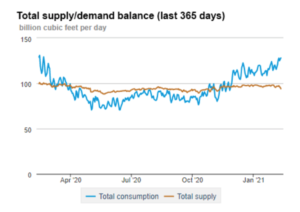
Sen. Marshall Calls on Kansans to Conserve Energy Following Recent Spike in Natural Gas and Propane Prices
(Washington, D.C., February 15, 2021) – This morning, U.S. Senator Roger Marshall, M.D. spoke with Kansas utility officials and community leaders about the recent spike in natural gas and propane prices impacting communities and residents. Prolonged and extreme cold temperatures across much of the Midwest have contributed to unprecedented demand for natural gas and propane, which has pushed prices to more than 100-times their average costs.
“I appreciate the dedication of officials in Kansas to ensuring our businesses and residents have the natural gas and propane needed to continue powering their homes and businesses through this cold weather,” said Senator Marshall. “We will be doing all we can at the federal level to confirm no foul play or price gouging has occurred and continue to support our utility companies and community leaders as they work diligently to keep Kansans warm. In the meantime, I urge my fellow Kansans to do everything they can to conserve energy and keep energy costs low.”
Background:
The current cold weather impacting much of the Midwest and eastern U.S. has put extreme pressures on the nation’s natural gas and propane supply. Natural gas is the state’s largest energy source, accounting for more than 30 percent of the state’s portfolio. Kansas maintains a robust natural gas storage system, which has been tapped to fill elevated demand. Additionally, freezing conditions have prevented new energy generation in many sectors, putting further pressure on the state’s utility companies. Energy costs are expected to increase in the coming days as demand continues to outpace supply. Utility companies and community leaders are asking all Kansans to do their part to conserve energy and keep their own energy costs low by doing the following:
Keep warm, not hot
When possible wear additional layers of clothing, consider turning down your thermostat and check your programmable settings.
Seal leaks around doors and windows
Apply weather stripping or caulk to seal gaps and cracks around windows and doors to stop air leaks and prevent energy loss. If that is not an option, you can also cover windows with towels, sheets or plastic to help keep the warm air in your house.
Reduce the temperature on your water heater
Set the temperature on your water heater to 120 degrees Fahrenheit or put it on the “warm” setting. If your home will be vacant for two days or more, set the dial to the pilot position for even more savings.
Close blinds and curtains
This helps keep warm air inside, especially if the sun is not shining.
Change or clean filters
A clean filter on your furnace can lower your energy consumption by 5% to 15%. Dirty filters cost more to use and overwork the equipment.
Hold off on doing chores
Doing laundry and washing dishes can both use natural gas to heat the water and your dryer. If you can, wait until the extreme cold weather passes to complete these activities. If you cannot wait, use the cold setting where possible.
Install foam gaskets on electrical switches and outlets
Electrical switches and outlets can account for up to 10% of your home’s energy loss.